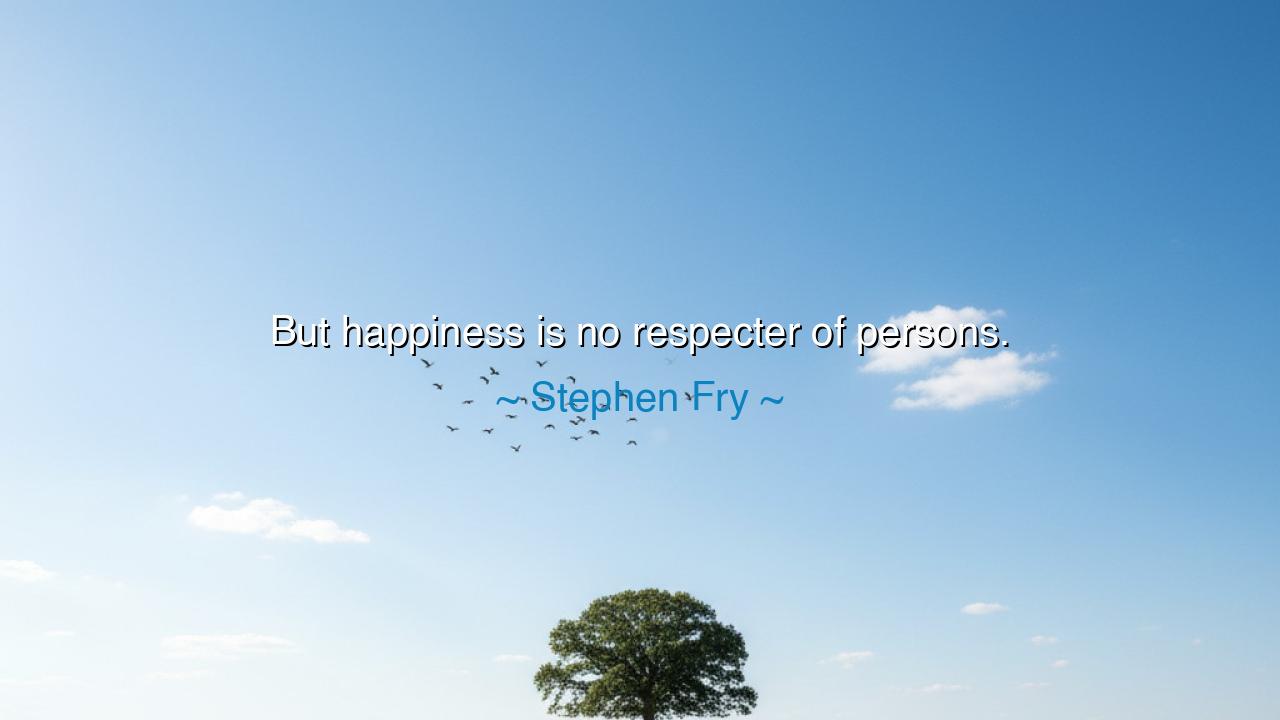
But happiness is no respecter of persons.






“But happiness is no respecter of persons.” — Stephen Fry
In these quiet yet resounding words, Stephen Fry, the philosopher-comedian, the man of wit and sorrow, offers a truth as old as humankind itself: happiness does not bow to rank, talent, beauty, or virtue. It visits the poor as freely as the rich, the humble as easily as the great. It follows no law of inheritance, and no amount of wisdom or wealth can command it to stay. In saying that happiness “is no respecter of persons,” Fry speaks with the insight of one who has known both success and despair — for he himself has wrestled with the dark tides of the mind. His words echo like the voice of a sage reminding the proud and the broken alike that joy is not earned by status, but found by grace.
The origin of this quote lies in Fry’s lifelong reflection on the nature of joy and depression. A man of immense intellect and success, Fry has never concealed his struggles with mental illness. In interviews and writings, he has often marveled at the strange democracy of happiness — how it can bless the beggar and abandon the king, how it may arise in the simplest of hearts and flee from those who seem to possess everything. His observation dismantles the illusion that happiness can be engineered through achievement or possession. Instead, it suggests that joy has a wild, untamable nature, belonging to no social class, answerable to no rule of logic.
To the ancients, this truth was no mystery. The Stoic philosophers taught that happiness, or eudaimonia, could never be bestowed by the external world. The wealthy Roman senator might lie awake in anguish, while the slave Epictetus, bound in chains, lived serenely within the fortress of his mind. Likewise, Buddha, born a prince, renounced his palace to discover that joy does not dwell in gold or power but in awakening — in the quiet understanding of the soul’s freedom from desire. Fry’s words belong to this same lineage of wisdom: they remind us that happiness cannot be bribed by circumstance. It appears where the heart is open, and it vanishes where the heart is closed, no matter how gilded the cage.
Consider the life of Abraham Lincoln, a man who bore the burdens of a nation yet lived under the shadow of melancholy. Even as President of the United States, adored and revered, he confessed that happiness seldom visited him. And yet, in the darkest years of war, there were moments — in laughter with a friend, in a letter from his son, in the triumph of conscience over despair — when light broke through the gloom. His story reveals what Fry meant: that happiness has no favorites, and it often visits us uninvited, even when sorrow reigns. It is not the privilege of comfort, but the miracle of being alive.
There is, in Fry’s observation, a warning to those who chase happiness as if it were a prize reserved for the chosen few. Many spend their lives believing that joy will come once they have achieved enough — enough money, enough fame, enough love. Yet the wise know that happiness laughs at such bargains. It arrives unexpectedly: in the warmth of sunlight through a window, in the forgiveness of a friend, in the small victories of the spirit. It cannot be owned, only experienced — and those who cease to demand it are often those who find it.
To say that happiness “is no respecter of persons” is also to proclaim its divine impartiality. It honors neither the scholar nor the fool, but only the one who is present. It dwells in simplicity, in gratitude, in the brief moments when the soul forgets its fears. The proud may command armies, but they cannot command peace. The humble may own nothing, yet carry light in their hearts. Thus, Fry’s insight humbles the mighty and uplifts the lowly: happiness is the one treasure that cannot be stolen, yet cannot be bought.
So let this truth be carried forward: seek not happiness in crowns or titles, but in consciousness itself. Do not envy another’s joy, nor despair over your pain, for both are transient. Live fully, feel deeply, and make space for wonder — for happiness will come when it will, not when you call it. Welcome it when it arrives, and let it pass when it must, knowing it belongs to no one, not even to you. For, as Stephen Fry reminds us, happiness is the freest of all gifts — a wanderer that visits whom it will, bound only by the openness of the human heart.






AAdministratorAdministrator
Welcome, honored guests. Please leave a comment, we will respond soon